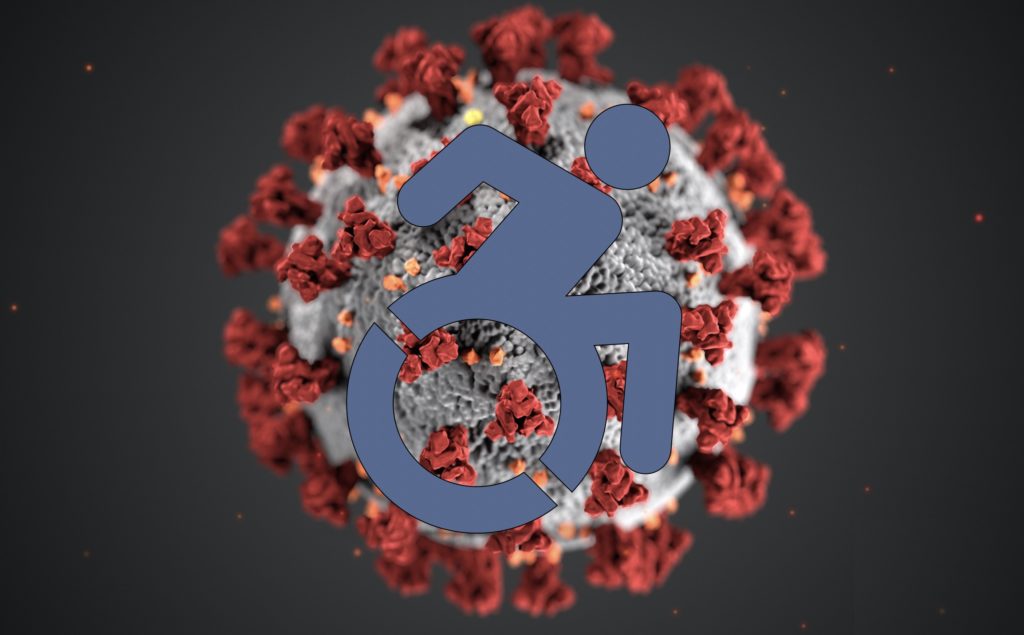
Coronavirus & People with Disabilities

It goes without saying that the Coronavirus (COVID-19) is rightfully the most important topic globally. With it being declared a pandemic by the World Health Organization, the entire world is at risk of being infected. Those who are older and with underlying health conditions are at the most risk of hospitalization, permanent health damage, and death. Many people with disabilities are have underlying health issues and are particularly vulnerable to Covid-19. Self quarantine and social distancing are effective measures to prevent getting infected, however these people may need other people and services to meet their medical needs. They are in that precarious space between the rock and a hard place.
I think of my father, who before he passed used a walker because of COPD and also on dialysis. Missing a dialysis treatment can be a life and death situation. Yet now, going to a dialysis center means potential exposure to Covid-19. Obviously in this situation the risk to exposure is probably the route to take.
But there are numerous other medical treatments and procedures that are a little more gray. Do they go for checkups, physical and occupational therapy sessions, have home healthcare workers over, etc. I’m not saying what the right answer is because I don’t know and every situation is different. There’s also the problem of transportation even if people do want to leave their homes because so many rely on public transportation. Which increases the risk of being exposed.
So what can be done to help protect yourself and others? Well I’m not breaking any new ground here but it doesn’t hurt to reiterate. According to WHO:
- Wash your hands frequently
- Maintain social distancing (3 feet from someone sneezing or coughing)
- Avoid touching eyes, nose, or mouth
- Practice respiratory hygiene (Covering your mouth and nose with your bent elbow or tissue when you cough or sneeze. Then dispose of the used tissue immediately.)
- If you have fever, cough and difficulty breathing, seek medical care early. (Check to see if you need to call first before showing up to a doctor’s office or emergency room to avoid straining the system or infecting others.)
- Stay informed and follow advice given by your healthcare provider
Some additional precautions to consider:
- If you or someone else is staying in a facility like a nursing home or rehabilitation center, ask that the building take precautions for visitors. Such as limiting the number of visitors, keeping away anyone who feels ill, and having sanitizer stations.
- If possible, limit visits to others. Communicate via phones, Facetime, video conferencing, etc.
- Don’t hoard medical masks or gowns. Medical workers need these desperately and if they don’t have them, they risk getting infected and then not being able to help others.
- Have meals delivered. While it doesn’t eliminate risk. it can lower it.
Finally, I try to avoid politics here, but I have to say that here in the U.S., the administration has handled the COVID-19 situation poorly. Knowledge of this disease has been known for months but they chose not to take the necessary precautions. Probably the biggest being not having enough test kits so we can understand the magnitude and spread of COVID-19. Right now people with symptoms are being denied testing. This is not the fault of the medical facilities as they are having to prioritize who gets tested because they have been given limited supplies and direction. A friend of mine is an epidemiologist in Colorado and is frustrated that they can’t test more people. The state I live in can only test 200 people per day which is woefully low. This is a large reason why there have been so many event cancellations because the magnitude of this disease is unknown. People in charge of these events have to take the most cautious approach.
The administration’s previous head in the sand approach has not helped things. Denying the importance of COVID-19 up until now has put the U.S. behind on preparedness and caused unnecessary spreading of the disease. I worry for my mother who is older and has lung issues. Her world is more dangerous now when it shouldn’t be.
For more information please visit the WHO’s website on COVID-19. Also this Forbes article also covers the topic of COVID-19 and people with disabilities.
